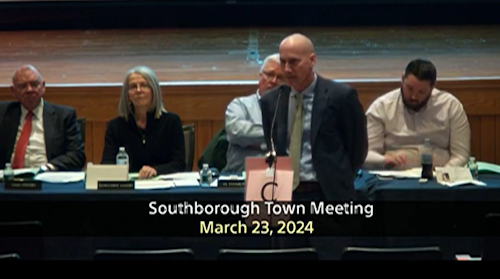Above: NSBORO’s Superintendent tried to persuade voters to create a Capital Stabilization Fund that would help the Regional district better budget for surprise expenses. (image cropped from SAM video)
At Saturday’s Annual Town Meeting, voters and officials debated the merits of three proposed stabilization funds for public schools. Two overwhelmingly passed. One failed.
Voters supported funds to stabilize annual costs for Southborough’s Special Education expenses and capital expenses for Assabet Valley Regional High School.
They weren’t convinced that establishing a stabilization fund was the right approach for handling Algonquin Regional High School “emergency” capital expenses.
In the discussions, former Advisory Committee member John Butler referred to findings from a whitepaper he wrote for the Town years ago arguing it doesn’t make financial sense to put aside money now for future unforeseen costs. Butler told the hall that you inevitably lose money when you prepay.
Multiple officials voiced agreement with his general take. But some carved out all or some of the proposed school funds as exceptions. (Scroll down for more detail on the two that were supported by voters.)
Algonquin Capital Stabilization
Northborough-Southborough Superintendent Gregory Martineau pitched that the stabilization fund would allow the school to better budget for unforeseen capital costs for maintenance and repairs.
Upon questioning, he Superintendent clarified that under the Regional School Committee’s Capital Policy, revised after a prior Article failed at Northborough’s Town Meeting. He said that the funds would only be used for emergencies. (It turns out that isn’t quite what the policy states.)*
Martineau referred to using the funds for necessary repairs/expenses that would otherwise cause a major issue, potentially forcing the school to be closed.
Advisory Chair Andrew Pfaff explained that his committee worried about the large funds that could be budgeted and spent under the law. He described scenarios that covered up to $330M, and even (with support from Mass Dept of Elementary and Secondary Education) assessing up to $1.5M. [Note: Pfaff followed up with me to correct my original reference to $330K and to provide a clearer explanation of the details. Scroll to the bottom for that.]***
Pfaff later followed that he would support creating a mechanism for stabilizing the capital costs. He suggested that the committee could come back with a future request for a revolving fund with specific parameters.
The Select Board had initially opposed the Article 4-1. But after Martineau explained that it was only for emergencies — something not mentioned in his February meeting with the Select Board and Advisory, two members switched their votes during the discussion.
Select Board member Kathy Cook explained that given the intent to only fund emergencies and to only spend $25K – $250K, the board’s majority decided to support the Article.
In the minority, Select Board member Al Hamilton noted that the Town has Reserve Funds that the Town can tap into to support the regional school if an emergency arises.
Referring to the emergency-only policy, Advisory member Howard Rose pointed out that policies and school committee members change over time. Multiple members of the Regional School Committee spoke in support of the Article, including Paul Desmond who pointed the potential for a failed boiler as an example of members’ worries.
In contrast, their Student Representative Cass Melo** opposed the Article. They told the hall that they trusted the current administration and committee members to make the right decisions but, echoing Rose’s concern, still opposed establishing the long term fund.
The Article failed. (The opposed vote wasn’t overwhelming, but was by a clear enough margin to not require a count.)
Southborough and Assabet Stabilization
In the case of Southborough schools, voters were reminded the Town is mandated to cover the cost for Special Education and transportation both in-district and out-of-district placements. A presentation highlighted the big year to year swings in those costs which make budgeting difficult. (You can read more about that here.)
For Assabet, Cook’s support was based on the fact that Southborough’s share of the costs split by seven towns is small. She didn’t think that the school should have to pitch small capital projects to all seven Town Meetings. Meanwhile, a major project would have to come to the Towns. (Again, you can read more about that here.)
*It’s possible that the Regional School Committee discussed an intent to use Capital Stabilization for emergencies only. However, the committee’s official policy adopted in 2022 includes, but is not restricted to, use of funds for emergencies. Therefore, it appears that spending on items other than emergencies wouldn’t even require revising the policy.
**For full disclosure, I’m Cass Melo’s mother.
***Updated (3/28/24 5:16 pm): Below is the clarification I received from Andrew Pfaff correcting my summary of his comment and providing more detail:
I was just looking at the article you posted on regional stabilization account and wanted to clarify a couple of points. First is the fund limit is 333 million not thousand. They can include up to 5% of aggregate amount apportioned to the member municipalities, which this year is $23,657,759 ($14,535,274 for Northborough and $9,122,485 for Southborough. This means that they could include in next years budget $1.183 million of funds to be moved into the account ($726,714 from Northborough and $456,124 from Southborough). This limit on annual charge however can be increased to a larger amount (doesn’t appear to have any limit) as may be approved by the commissioner of elementary and secondary education, Russell D. Johnston.


